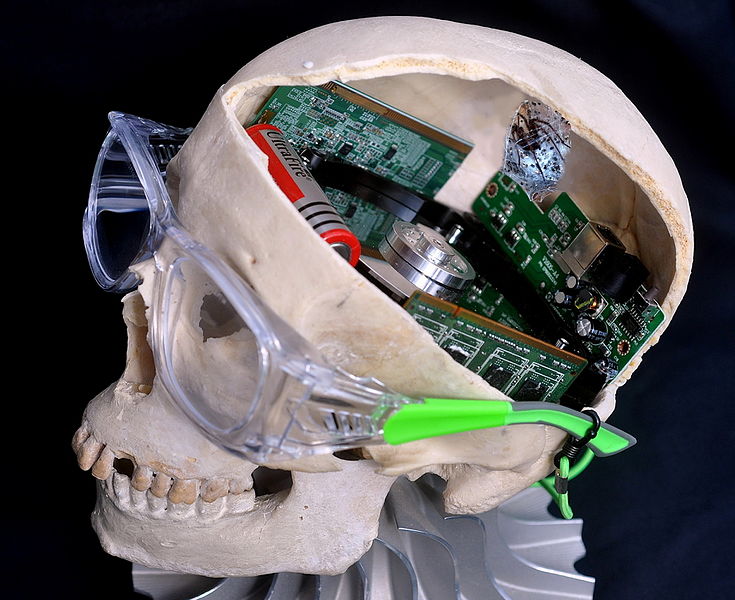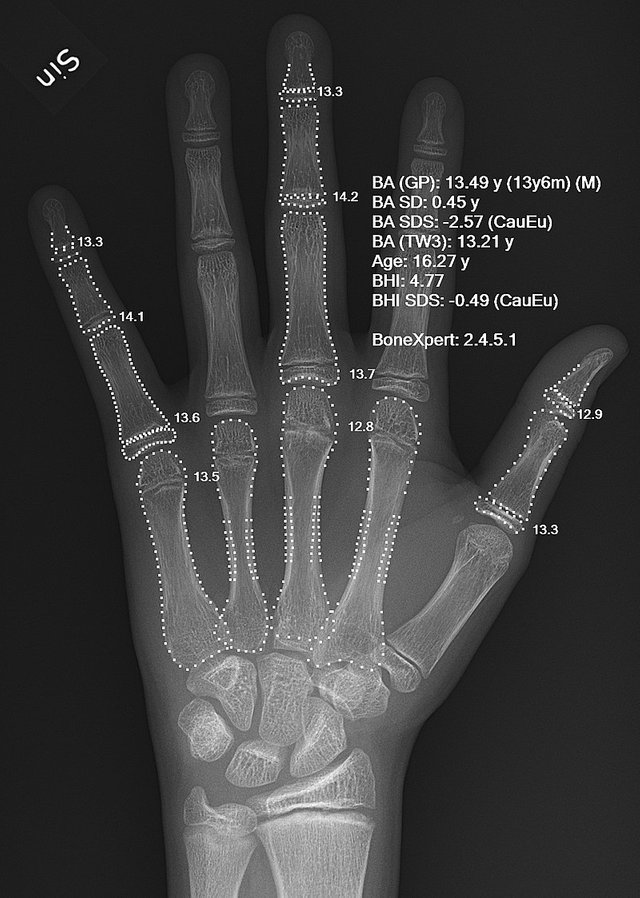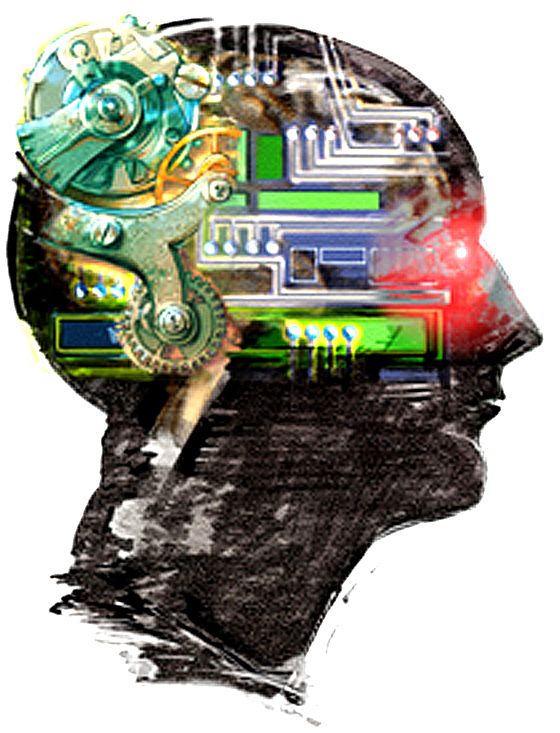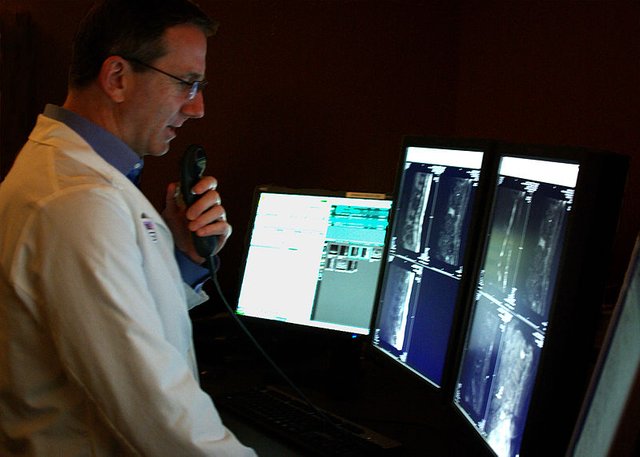AI Doctors: The Possibility, Prerogatives, and Problems
Hi Friends,
Earlier in the day, I was at the hospital (you really don't want to know what I was doing there). Upon my arrival, the grave silence that greeted me was so unusual. I mean, the General Hospital that I knew would be buzzling with feverish children letting out shrill tears, pregnant women all gathered in the antenatal area holding their protruding stomachs and opening their legs to the wind (the sight of this always made my stomach churn). And then, there were the very sick ones, the ones you couldn't look in the face twice. But today, at the hospital, none of these were in sight. Rather, all there was was a desert peace. Walking up to someone who looked like a doctor, I was able to confirm what I already knew: There was a strike, and so doctors have abandoned their places of duty.

Image Source: Wikimedia; Author: Royonx; Public Domain Licensed)
Despite the indispensable and non-negotiable role of the health care sector in the ensurance of 'normalcy' in the world, we find that it is coloured by a lot of unavoidable flaws that has hampered its effectiveness. These issues ranging from the shortage of healthcare workers to the human limitations of the available ones, calls for a probe into the future of health care. Even with the availability of human doctors and medically inclined machines harnessed in health care practices, would these be sufficiently enough to cater for the nearest future? And besides, given the rapid way in which technology and Artificial Intelligence is swamping every facet of human endeavours, isn't it only proper that these new upgrades are used to add new props to the ever insufficient medical hands available, you know, like in form of Artificial Intelligent doctors? With this on my mind, I have outlined the possibilities of having AI doctors in the very nearest future, the accompanying advantages and the flaws.
AI Doctors: The Possibility

Image Source: Wikipedia Author: Mikael Haggstrom Public Domain Licensed
True enough, AI scientists and developers have found their way into the hearts of human doctors by providing quite a handful of technological aids that make life easier for them, and for the patients. For example, in determining the True Negativity of cancer in a human's body, doctors have to rely on a number of tests as well as their instilled knowledge of the symptoms. But judging the condition of a person through standards as old as time might be quite deceptive, and consequentially hazardous for the affected patients. In combating these risky probabilities, data scientists have proven that they can viably validate the accuracy of index results by comparing them to what is called a Gold-Standard Error free test. Also, Google AI are aiding in detecting diabetes eye disease by being able to recognise the leaky fragile blood vessels at the back of one's eye.
But it comes as a fact that medical practitioners do not trust their laboratories to the developments doled out to them. And what's more, they don't appear ready to open their consulting rooms to a troll of Artificial Intelligent doctors or algorithms. Accordingly, most of them are of the view that although there are lots of rooms for improvement in the Healthcare sector, it will be too extreme and insensitive to lend one of these rooms to technically oriented AI algorithms.
However, these reservations have not prevented AI experts from conceiving the presence of AI doctors amidst a human medical staff. Even as early as in the 70s and 80s, certain US scientists were optimistic about the possibility of having AI help doctors in diagnosing conditionsand prescribing solutions. Through their optimistic drive, such programs as INTERNIST and MYCIN. Although these programs did not exactly achieve their operational goals, they served as landmarks leading to the later intensified approaches taken in this direction.
Ever heard of the HUMAN DX PLATFORM? It's an Artificially Intelligence (AI) app aimed at improving the accuracy of individual doctors and physicians. It does this by helping the physician solicit advice from several medical practitioners all over the world. The several advices given are then analyzed and filtered by the app, giving the physician a neat rank of probable answers to the problem. It is some sort of medical crowdsourcing. And yes, it is already in use. Because it is quick and convenient, it has easily helped in increasing the safety net of patients that come to physicians with their symptoms. When a physician has a hunch about a diagnosis, such physician can quickly attempt to run it through the specialists on the app, rather than wait upon several test results. This AI-assistive healthcare app, created by the Human Diagnosis Project, is still very much under study and hence, more upgrades are expected.
From all indications above, it is actually apparent that while the possibility of having full-fledged AI doctors replace the human ones is still very much in doubt, it is only a matter of few years, and we will have our medical diagnosis fully performed by the AI system. The technology called Deep Machine Learning, the same one behind self-driving cars, AI voice assists and image recognitions is what will make this happen. Thus, our human doctors will definitely be around for a good number of donkey years. But for now, through machine learning, they can receive a good dose of help with regard to diagnosis.
AI Assisted Healthcare: The Prerogatives

Image Source: Wikimedia; Author: Alejandro Zorrilal Cruz; Public Domain Licensed
Recently, a group of doctors, with one Stephen Weng at the head, compared the normal, routinal guidelines provided by the American College of Cardiology/American Heart Association (ACC/AHA) with four machine-learning algorithms in predicting heart attacks. And needless to say, after these algorithms were trained and tested, their predictions were accurate and faster. This, of course, led to early prevention of the crises.
As machines are not given to the fallibility and trajectory of the human body, they achieve a higher level of accuracy in diagnosis. Also, these AI machine learning diagnostic alternatives are cheaper, as they are mere algorithms, not heavily built facilities. Again, they are very accessible. With just an internet connection, they can be put to use. And yes, they are efficiently fast. Hence, they can easily assess patients even while the patients' conditions remain unchanged. And medical laboratories will no longer have a need for waiting lists.
All these will make for affordable, and easily accessible health care services.
The Problems

Image Source: Wikipedia Author: Zackstarr CC BY SA 3.0
While many are excited at the prospects inherent in a fusion between man and machine, they have also expressed fear at its downsides. For one, in the building and training of machine-learning algorithms, a lot of data is required. Apart from the medical knowledge, researches and resources from experts that will go into them, the AI algorithms will need to be kept abreast with every single real case scenario bordering the field it is being trained in. To ensure these processes of data collection and analysis, every single medical conversation will be recorded, files which used to be confidential and medical lips that used to say nothing about patients conditions will all be let out to some diagnostic algorithm. The implications of this are very massive.
Apart from the fact that it breaks every medical oath one can think of, it might also hampers the safety and security of patients and providers. If these algorithms are hacked and accessed by unauthorized sources, all hell can be let loose.
Also, the expectations laden on machine-learning in helping health care grow have been said to be somewhat unrealistic (an example is my humble self, wanting an AI doctor and nurse to replace the tender loving care of the human counterparts).
And the most prevailing question is in the occasion of a wrong diagnosis, prescription or recommendation meted out by an AI system, who do we blame?
References
https://www.scientificamerican.com/article/artificial-intelligence-medical-tests-software-diagnosis/
https://towardsdatascience.com/how-data-scientists-can-convince-doctors-that-ai-works-c27121432ccd
Good article but I was wondering why you did not use any image?
Was going to edit it right away. Issues with power supply. And there was the whole network thing. It's quite painful that I wasn't patient enough to raise the standard of the post.
But it's all good now. I have put in relevant images.
Not a bad idea, I suppose working with human doctors will produce beautiful results. However, if you are talking about outright replacement, I wouldn't mind replacing those perpetually angry and bitter women at those hospitals with AI Nurses. Well done.
You are quite right here. I have a lot of close up contacts with these doctors and nurses. And most times, they make want to never step into a hospital again. But going there is somehow unavoidable.
Nice article.... Kudos
Was really worth the read.
Thank you @cyprianj. I am glad you liked it.